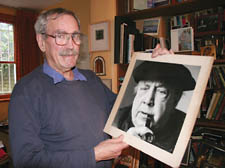|
|
 |
| |

Tom Priestley with a photo of his father |
War on the front line and life on the home front
Written before he became a famed novelist and broadcaster, JB Priestley’s letters to his family reveal his experience of the life in the trenches
during the First World War, writes Dan Carrier
AS he walked home from Hampstead to Highgate along the Spaniards Lane, and gazed out across blacked-out London, writer and broadcaster JB Priestley heard something that reminded him why the war was being fought.
He was behind Sunday night broadcasts on the BBC called Postscript, which were part of the Ministry of Information’s attempts to keep up morale.
What he saw on his evening stroll with his wife back to his home in The Grove, Highgate, became the centrepiece for one of his best-remembered talks, and one which is printed in full in this new book, Priestley’s Wars, which uses previously unpublished writings by the author to illustrate his political views.
He told his listeners: “I like the Whitestone pond. On fine afternoons boys sail their toy boats on it and when there is wind blowing across the Heath, the toy boats have to battle with enormous wave – about three inches high.
“At night, this pond is like a little hand-mirror that the vast, sprawling, yawning London still holds negligently; and you see the stars glimmering in it.
“Well, the other night was one of those mysterious nights we’ve had lately when there seems to be a pale light coming from nowhere, and the sky has a pure washed look. The dim lights of a few cars could be seen in the dusk round the pond, and some people, late as it was, were standing and staring.
“We stopped, and heard a solicitous quacking and a great deal of faint squeaking. Then we saw on the pond, like a tiny feathered flotilla, a duck accompanied by her minute ducklings, just squeaking specks of yellow fluff.
“We joined the spectators. We forgot the war, the imminence of invasion, the doubts about the French fleet, the melancholy antics of the Bordeaux government...”
Edited by historian Neil Hanson and JB’s son Tom, the book offers previously unseen works by the writer whose books such as The Good Companions and An English Journey have become classics.
It covers three periods of his life, and all are used to shed light on his political views: his experiences as a soldier during the Great War, his broadcasts for the BBC during the Second World War, and his role in establishing the Campaign for Nuclear Disarmament in the 1950s.
Priestley joined the army in 1914 and saw active service through-out the war.
Letters from the period are particularly illuminating: he rarely refers directly to his terrible experiences in the trenches. He briefly mentions the war in An English Journey, a travelogue through the country in 1933. He went to a reunion dinner in Bradford of his old regiment and was haunted by the faces that were not there, young men he had befriended who had not survived.
And Tom says his father never spoke of the terrible ordeal his generation had gone through.
“He found it very difficult to talk about it,” says Tom. “The war was a common phenomenon – it was so horrific, particularly to the people who had been in it. On the one hand they wanted to blank it out and on the other hand they felt people who were not involved
personally would not, could not, understand.
“My father said at the time, when he might have written about it, that others had covered it better – but that was an excuse. Inside, perhaps he simply did not want to deal with what he had gone through.”
Priestley joined the Duke of Wellington’s West Riding Regiment in September 1914 and his experiences are recounted to his family in a series of revealing letters.
He speaks of the training he went through, the route marches from a succession of tented camps across the South-east, before being posted to France.
He goes on to reveal the horror of trench life, of being posted to a section of the front line that ran through a cemetery: the bones of the dead were exposed and Christian iconography of the tombstones, which they crouched behind, added a surreal touch.
The letters are particularly illuminating as they were written before he had become a professional writer, and were for his family’s eyes only.
“I do not know where or how the letters survived,” says Tom. “JB’s father, who the letters were addressed to, died in the early 1920s, so my step-mum must have kept them. I came across them when I was making a film with my father, just before he died. He had them then, and refers to them in his autobiography Margin Released, where he says he was looking through them.
“In essence the letters are the experiences of a young man, like the experiences of hundreds of thousands of other young men. He is talking directly to his family.
“Here is a man who became a well-known writer but when he was doing this it was not the case, so it also provides a glimpse of him before he became a writer. They are very expressive and he talks about the horrific conditions and the casualties.”
• |
 |
|
 |
| |
|
 |
|


